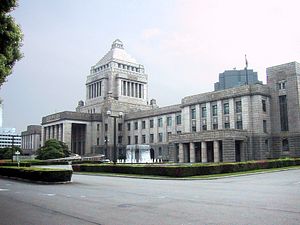In Tokyo, Prime Minister Shinzo Abe and the ruling Liberal Democratic Party (LDP) are preparing to ring in the new year beset by scandals – again.
The cherry blossom viewing party scandal, the first of two relatively high-profile ongoing scandals in recent weeks, involves allegations that guests at the tax-funded cherry blossom viewing party were supporters of Abe and other political figures. The extraordinary Diet session, which was rocked by the allegations, concluded on December 9 without a full investigation into the matter, leaving opposition party lawmakers and members of the public dissatisfied with the proceedings.
The newer of the two scandals involves House of Representative lawmaker Tsukasa Akimoto. Akimoto was arrested last week by the Tokyo District Public Prosecutor’s Office on suspicions of accepting 3.7 million yen in bribes from 500.com to give them preferential treatment in their bid to building a gambling facility. He was the minister in charge of the government’s casino initiative at the time.
But this is not the first time that the Abe cabinet has been hit by a scandal, or even multiple scandals simultaneously. Abe has politically survived all prior scandals, and the ruling LDP’s behavior betrays a confidence that they will survive these as well. On Thursday, the LDP rejected opposition parties’ demands for an off-session meeting of the Diet to look into the Akimoto case, though an early January meeting of Diet affairs chiefs from the LDP and Constitutional Democratic Party of Japan (CDPJ) before the Diet reconvenes was agreed to. The Diet is expected to start its ordinary session on January 20.
Opposition parties speculate that Abe will try to use a Lower House snap election early next year to secure an electoral victory and silence doubts generated by the ongoing scandals. However, LDP sources consider such a gamble too risky for Abe to consider. Indeed, in a December 21-22 Asahi Shimbun survey, the public’s approval rate for the Abe cabinet (38 percent) was lower than the public’s disapproval rate (42 percent) for the first time in a year. Abe’s response to the ongoing scandal over the tax-funded cherry blossom viewing party was considered “insufficient” by 74 percent of survey respondents. Even among LDP supporters, the government response was considered “insufficient” by 67 percent of respondents.
Snap elections can be used with great effect to keep opposition parties off-balance or prevent opposition parties from unifying by not giving them enough time to iron out their differences. Currently, the electoral threat, if any, from the opposition parties to the LDP remains far distant. Though CDPJ is in merger talks with the Democratic Party For the People (DPFP), they still have 20 items to work through and they will miss their own year-end deadline.
Members of the House of Representatives are elected for four-year terms, and the last House of Representatives election was held in October 22, 2017, meaning Abe is not obligated to hold elections again until October 21, 2021. Looking ahead to October 2021 – or, more likely, earlier – a total of 656 people are preparing to run in the next Lower House elections according to a survey by Jiji Press. Of the 656, 298 of these individuals plan on running as an LDP candidate and 249 as independents or a candidate on the CDPJ, DPFP, the Japan Communist Party, or the Social Democratic Party ticket. To prevent the LDP from achieving the two-thirds majority it needs to propose a constitutional amendment for approval in a national referendum, the opposition parties will need to astutely coordinate who runs in which districts.
This kind of electoral coordination has been at the heart of the LDP-Komeito alliance. Begun as a three-way coalition government between the LDP, Komeito, and the Liberal Party in 1999, it continued as a two-way agreement from 2003 onward even after the Liberal Party defected. The arrangement served both parties’ interests to be the “party in power.” But given Abe’s hawkish inclinations and the pacifist philosophy of Soka Gakkai, the electoral backbone of Komeito, the alliance has been at times tense regarding security policy. Even though Komeito has caved numerous times to LDP pressure in recent years, changing the constitution to recognize the Self-Defense Forces as a military will be the greatest challenge to the LDP-Komeito coalition yet. Though the mutually symbiotic electoral relationship between the LDP and Komeito will likely continue, an ideal outcome for the LDP would be one where either the LDP on its own or with other like-minded parties wins sufficient seats to not require cooperation with the Komeito to get constitutional amendment proposed.
Despite the two scandals and the potential challenges of coordinating with Komeito in the future, there is not much for Abe to worry about. As 2019 ends and Abe is about to conclude the seventh year of his (second) premiership, his grip on power seems as secure as ever – if only because there are still no credible alternatives to his rule within the LDP or any of the opposition parties. And that, in a nutshell, is the reason why no political scandal thus far has been able to dethrone Abe.

































